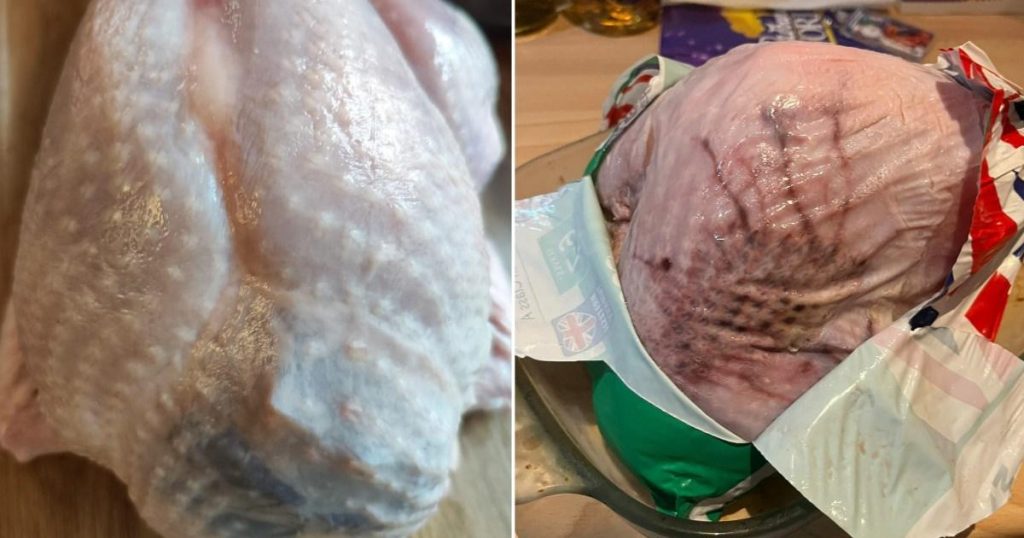The Christmas Turkey Debacle: A Festive Feast Turned Foul
The festive cheer of Christmas 2023 was marred for some families in the UK as their centerpiece Christmas dinner, the traditional roast turkey, turned into a source of disappointment and disgust. Customers of three major supermarket chains – Sainsbury’s, Tesco, and Lidl – reported instances of spoiled turkeys, despite the birds bearing use-by dates that extended beyond Christmas Day. Social media platforms became the sounding board for frustrated consumers who shared their experiences of foul-smelling, discolored, and frankly, rotten turkeys, casting a shadow over their holiday celebrations. The complaints highlighted a significant lapse in quality control, raising questions about the handling and storage practices within the supply chains of these major retailers. The timing of the discovery, predominantly on Christmas Day itself, exacerbated the problem as finding replacement turkeys proved near impossible, leaving many families scrambling for alternative meal options.
A Social Media Storm of Spoiled Poultry:
The digital landscape became a canvas for culinary grievances as disgruntled customers flocked to platforms like X (formerly Twitter) and Facebook to document their unfortunate turkey tales. Images of greenish, discolored flesh and accounts of rancid odors accompanied posts expressing frustration and disappointment. One Sainsbury’s customer shared a particularly graphic photo of a turkey crown marred by a large patch of rotten flesh, declaring Christmas "officially ruined." Another Sainsbury’s shopper lamented the spoiled turkey purchased just the day before Christmas Eve, questioning how such a product could be sold in the first place. Similarly, a Tesco customer resigned himself to a Christmas pizza dinner after discovering his turkey had gone off prematurely. These online accounts painted a picture of widespread dissatisfaction and raised concerns about the quality control measures employed by these supermarkets.
From Fresh to Foul: A Range of Rotten Revelations:
The complaints spanned various types of turkeys and storage methods, suggesting systemic issues rather than isolated incidents. Some customers reported issues with fresh turkeys purchased just days before Christmas, while others encountered problems with frozen birds that had been thawed for preparation. One Lidl customer, Nikita Kotulinska, described her fresh turkey, purchased on Friday and stored appropriately in the refrigerator, as "fully rancid" with a putrid smell and green discoloration. Another Lidl shopper, R Smith, shared images of a blackened, spoiled frozen turkey that was supposed to be safe to consume until June 2026. These varying accounts pointed towards potential problems at different stages of the supply chain, from sourcing and processing to storage and distribution.
The Aftermath: Seeking Resolutions and Explanations:
The timing of these discoveries, primarily on Christmas Day, compounded the problem, leaving affected customers with limited recourse. With most stores closed for the holiday, finding replacement turkeys was a near impossibility. Many took to social media to demand refunds and explanations from the respective supermarkets. Sainsbury’s responded by acknowledging the issue and stating that they were contacting affected customers to apologize and investigate the matter. Tesco and Lidl were also approached for comment, but their responses were not included in the original article. The incident underscored the importance of robust quality control measures and the need for supermarkets to address customer concerns promptly and effectively, especially during peak seasons like Christmas.
Beyond the Immediate: Broader Implications for Food Safety and Consumer Trust:
The Christmas turkey debacle raises broader questions about food safety standards and the responsibility of supermarkets to ensure the quality of the products they sell. The scale of the complaints suggests potential systemic issues within the supply chains of these major retailers. The incident also highlights the vulnerability of consumers, particularly during holidays when access to alternative options is limited. The erosion of consumer trust is a significant consequence of such incidents, and supermarkets must take proactive steps to regain that trust by thoroughly investigating the causes of the problem and implementing measures to prevent similar occurrences in the future.
The Future of Festive Feasts: Lessons Learned and the Path Forward:
The spoiled turkey saga serves as a stark reminder of the importance of vigilance in food handling and storage, both for retailers and consumers. Supermarkets must strengthen their quality control measures at every stage of the supply chain, from sourcing and processing to distribution and storage. Clear communication with customers about proper storage guidelines and potential risks is also crucial. Consumers, on their part, should be mindful of best practices for handling and storing perishable food items, especially during festive seasons when large quantities of food are often purchased and stored. Ultimately, a collaborative approach between retailers and consumers is essential to ensure that future festive feasts are free from such unpleasant surprises.


